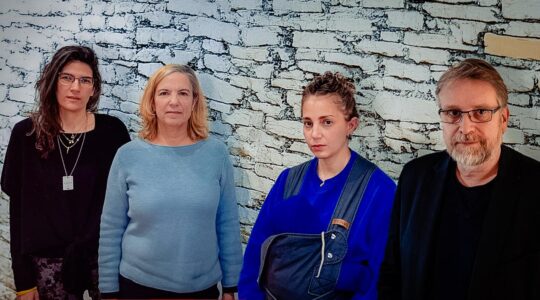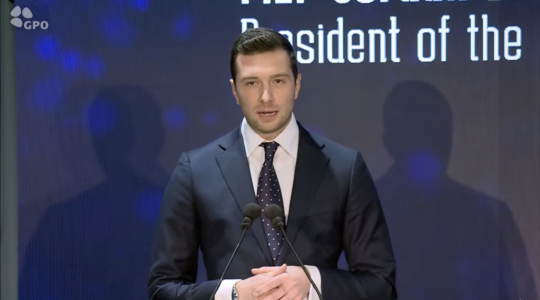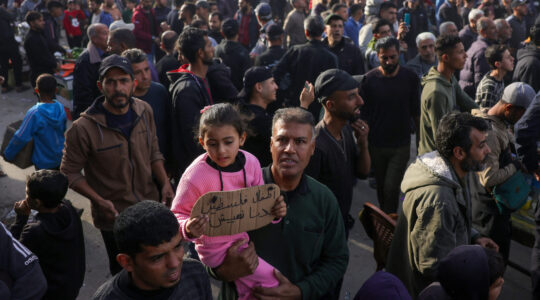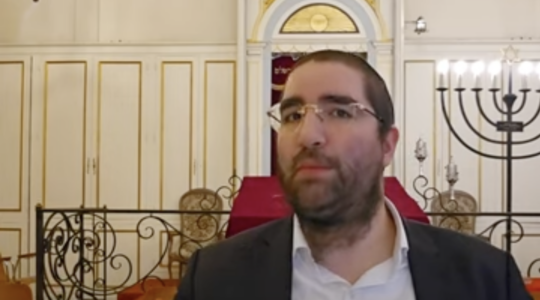
Lt. Col. Bernhard Fischer, a Jewish officer in the protocol branch, in his office at the German Federal Ministry of Defense. (Toby Axelrod)
BERLIN (JTA) — In an office amid a labyrinth of hallways in Germany’s Ministry of Defense, a short jaunt from where Claus von Stauffenberg was executed in 1944 for trying to kill Adolf Hitler, sits Bernhard Fischer, lieutenant colonel and Jew.
What’s a nice Jewish guy doing in a place like this?
“The history of this place is clear to me. But life is normal today,” said the 59-year-old protocol officer, surrounded by souvenirs from Israel and elsewhere. “Germany is a democratic country and one can live here — and live here well.”
Of course, Fischer would be the first to admit it’s much more complicated than that for Jews in the Bundeswehr, modern Germany’s military. No one knows the exact number, but insiders guess there are some 200 Jews in a military of about 200,000.
Many of them, such as Fischer, have complex family histories. His mother’s family moved from Germany to South Africa prior to World War II. She returned to Germany in 1945 and married a Catholic German. “But our Jewish identity was always there,” he said.
In 1971, while visiting relatives in Israel, Fischer met his future wife, whose family had made aliyah from Tunisia. They moved to West Germany in 1975 and have three children.
Until the postwar obligatory conscription was dropped last year, Germans whose parents or grandparents were victims of Nazi persecution were exempted from military service.
Nevertheless, some chose to serve. Michael Fuerst signed up in 1966 and is likely the first Jew to do so in West Germany. The Jewish community called him “the shmuck from Hanover who joined the army,” he recalls with a laugh.
To Jews from the outside, such patriotism may seem odd. But like all social and legal institutions in West Germany (which carries over to today’s unified Germany), the military was remade in a democratic image.
One major difference is that soldiers are empowered to disobey a command if they believe it would lead to a criminal act. And unlike in Hitler’s day, soldiers do not swear allegiance to the Fuehrer “but to uphold the constitution and defend the freedom of the German people,” Fischer said.
The earliest records of Jews in Germany go back to the fourth century. Lt. Col. Gideon Romer-Hillebrecht, the co-editor with 1st Lt. Michael Berger of a new tome on “Jewish Soldiers-Jewish Resistance in Germany and France,” says Jews may have fought in Germanic troops as early as the 13th century. But it wasn’t until Napoleon’s conquest of the western regions that Jews were granted equal rights — including the right to be drafted, Romer-Hillebrecht told JTA.
In World War I, more than 100,000 Jews served — that was about a fifth of the German Jewish population at the time — and about 12,000 died on the front. Hitler later blamed Germany’s defeat on Jewish soldiers.
Fuerst, an attorney who has chaired the Jewish Association of the State of Lower Saxony since 1980, said his grandfathers and uncles served in World War I, “but nobody was protected by that.” Some of his relatives fled Nazi Germany to the United States, but his paternal grandfather died in the Riga ghetto. His mother survived Theresienstadt.
“I am a German patriot, but you know, I know exactly what happened here,” Fuerst said. “That is the difference between the normal patriot and the Jewish patriot.”
Fuerst was born in 1947 in Hanover, his father’s hometown. In 1966 he signed up to become a paratrooper — the only one of his Jewish friends to join the Bundeswehr.
“I always heard from my other friends that I am German, so there were no discussions in my family about whether I would go to the army or not,” he said.
During the 1967 Six-Day War, he considered fighting for Israel. “For me it was not so easy. I thought, ‘How can I get to Israel?’ But after five days I did not have to think about it anymore,” Fuerst said.
“I have no dual loyalty,” he adds. “I have loyalty only for Germany and for my Jewishness.”
Still, his fellow soldiers sometimes admired him simply because they looked up to Israeli paratroopers, Fuerst says with a laugh.
Fuerst says he rarely experienced anti-Semitism, either before or during his service. But he balked during an early military apprenticeship when a captain told the trainees, “Don’t be so loud: You’re not in the Jew school.”
Fuerst asked to be transferred to another course. The captain responded, “It is good that you request this because I have to tell you, I am an anti-Semite … All the problems we have in Germany were brought to us by the Jews.”
The captain was dismissed from his post the next day.
Romer-Hillebrecht, 46, whose mother was Jewish, joined in part “to heal my own family history.” His Jewish ancestors “lost their whole identity, their belief in the German state.”
While serving recently in Afghanistan, he either received kosher rations from the American forces or ordered frozen meals from a glatt kosher caterer back in Frankfurt.
“Sometimes the others were jealous,” joked Romer-Hillebrecht, deputy chair of the Association of Jewish Soldiers, a 6-year-old group with about 25 members and functions like a “virtual memorial” to the history of Jewish soldiers.
One member, Rainer (Reuven) Hoffmann, 64, has contributed articles in two books the group has published.
Probably the main reason his Jewish mother survived the war, Hoffmann says, is because she married a non-Jew — Hoffmann’s father — in 1933. The rest of her family was scattered throughout Europe. A brother died in Auschwitz; two other siblings survived.
“But my mother did not speak about this time,” he said.
During the height of the Cold War, Hoffmann’s sense of patriotism surged. “We had the Soviet army at the border,” he said. “I felt we needed to defend our country and our political system.”
Like Fuerst, he considered fighting for Israel in June 1967. “I thought perhaps I am serving in the wrong army. But it was over too fast.”
After 15 years in the military, Hoffmann returned to school and became a consultant to various industries. He also took part in political and Jewish life in his hometown of Duisburg, particularly after far-right arsonists attacked a synagogue in Luebeck in 1994.
At the time, his father advised him “to leave Germany because the Nazis will come back. I told him, ‘No, they won’t come back. We will stay here.’ ”
Spiffy in his uniform at the recent book presentation, Hoffmann took the chance to chat with Jewish soldiers whom he rarely sees.
“Even Jews don’t know that there are other Jews in the army,” Hoffmann joked with Batya Goetz, a 35-year-old medical officer specializing in anesthesiology.
Goetz, who converted to Judaism in 2003 after completing a medical internship in Israel, joined the military medical corps at the end of 2010. She is stationed at the military hospital in Berlin.
“Yes, I love my country,” the young doctor said. “I would not want to live anywhere else. But at the same time, I am a European [citizen]. And the Bundeswehr recognizes that. It’s a very international army.”
It’s also a multicultural army, says Goetz, who tries to take off for Jewish holidays. “But I have worked every Christmas since I started,” she says with a smile.
In today’s Bundeswehr, soldiers of all stripes face the same risks. But for many “Jewish patriots,” the past is always present.
“I have had the chance to do all those things that my Jewish ancestors could not,” Hoffmann said. “I feel satisfied. But probably this work of remembering will never be done.”
JTA has documented Jewish history in real-time for over a century. Keep our journalism strong by joining us in supporting independent, award-winning reporting.





